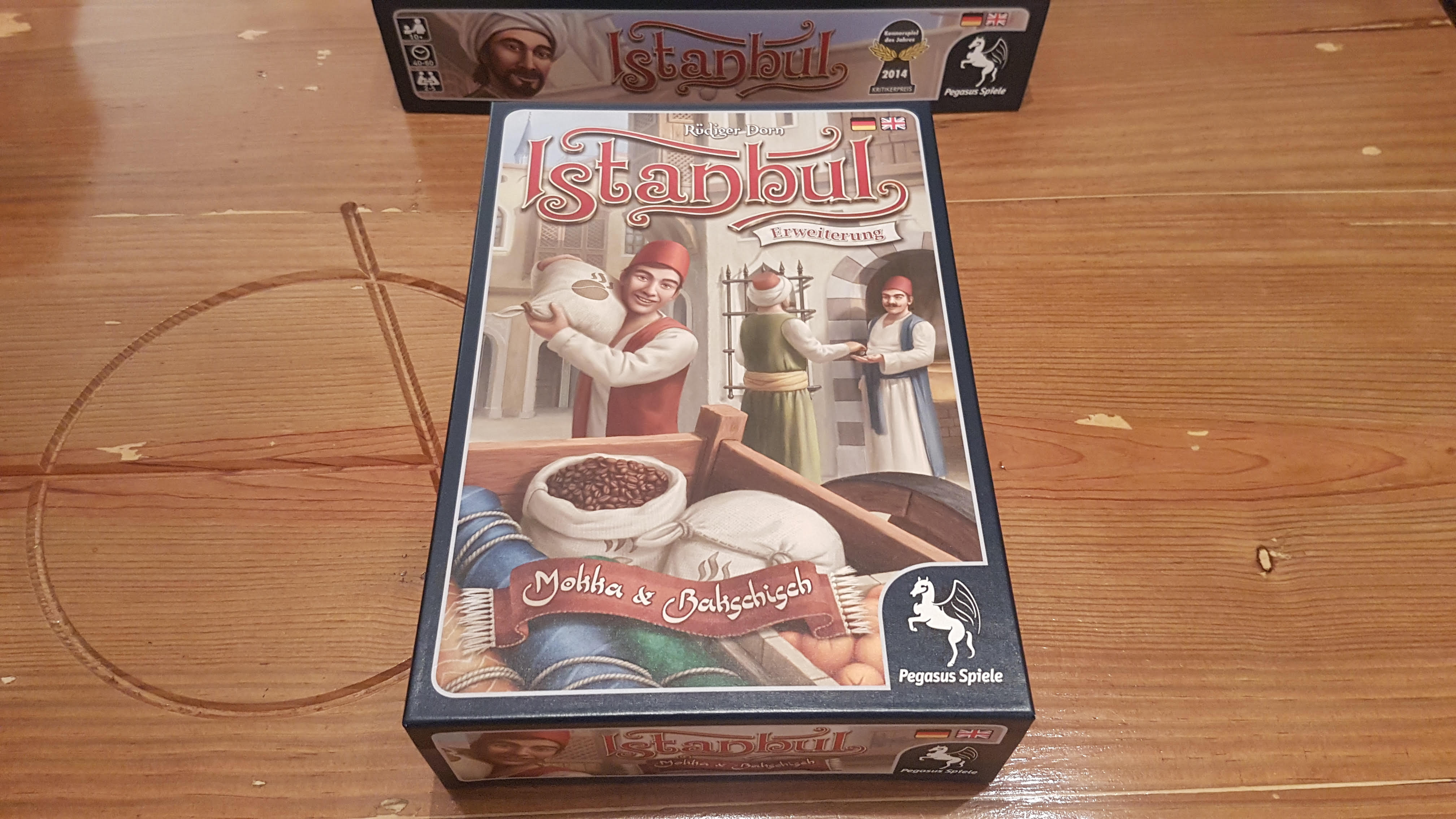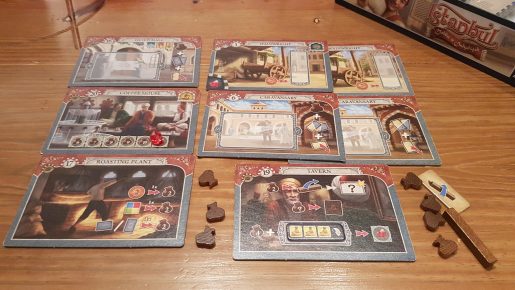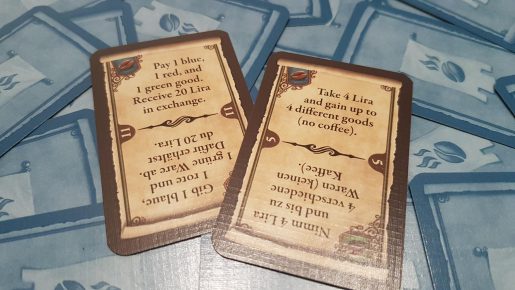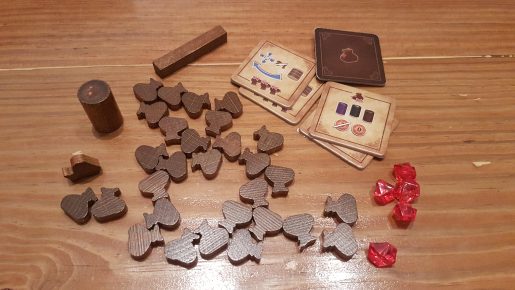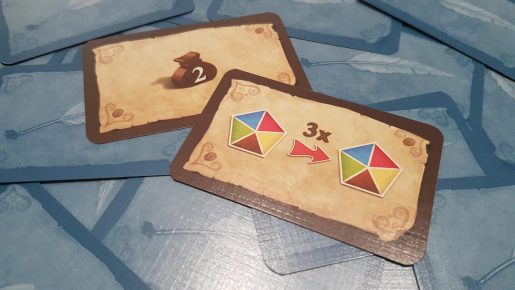Istanbul: Mocha & Baksheesh is the first expansion for designer Rüdiger Dorn’s 2014 title Istanbul. Published by Pegasus Spiele, this expansion sees coffee added into the mix, on top of the fruit from the base game. This brand-new resource will be available at new locations, some of which will also come with a new way to gain those coveted rubies! However, did the city of Istanbul need to grow in size? Let’s find out!
This expansion comes with a whole host of components, including but not limited to new location tiles, a coffee trader, coffee tokens, a barrier, tavern tiles and new cards. Each of these elements are to be added in one hit, unlike more modular based expansions, fitting together with the base content to make one streamlined, bolder Istanbul experience. Though, how does each element effect the gameplay?
Six locations are included in the expansion box, and mathematically adding these to the 16 tiles from the base game would create an unusual shape. Stopping this occurring is the fact 2 of these new tiles are replacements for the original Wainwright and Caravansary tiles. The reason they are replaced is that their new versions feature all 5 resources; with coffee alongside the four fruits. The only change to the Caravansary is that in addition to the base game rules the player will also receive a coffee bag resource token.
The first of the brand-new locations is the Roasting Plant. The Roasting Plant poses a great way to instantly gain a lot, up to 6, coffee bag tokens. Players can perform either or all of three trade opportunities: Pay 2 Lira to take 2 coffee bags, pay a good to take 2 coffee bags or discard either a Bonus or Guild card to take 2 coffee bags. The value of coffee might not be instantly apparent until you hear of the Coffee House. Activating this space allows a player to deliver coffee in exchange for a ruby. As with the regular ruby trackers whenever the action is taken, and a ruby is claimed, the cost for the future is increased, seeing the price rise from 6 to 10 coffee bags.
The Guild Hall unsurprisingly introduces the new type of card into the game, in the form of Guild cards. Visiting this location will see the player gain a coffee bag and two guild cards, followed by the player needing to discard a Guild card from their hand. This new card type can be played instead of a normal turn, of moving a merchant and assistants. They give abilities such as taking 4 Lira and 4 non-coffee goods from the bank or paying 15 Lira to take the next ruby from Gemstone Dealer and gain a coffee. These are key to keeping the game time down as players don’t need to continually venture across the entirety of the board to get to a single tile, allowing unique strategies to develop based upon the cards drawn.
The Tavern is potentially the most unique of the new locations coming with a choice of three new actions. The first option is to take a Tavern tile, with player only able to gain one of each type: movement and encounter. These give bonuses such as being able to move any number of spaces in a straight line, so can be almost a necessity depending on the map generation. Players can instead choose to pay 4 coffee and the goods depicted on the Baksheesh tile to gain the next available ruby from either the Sultan’s Palace, the Gemstone Dealer or the Coffee House. Once this action is complete the Baksheesh tile is flipped to show the new goods requirement for the action.
The final Tavern action is to pay 2 coffee bags to place the Barrier component between two tiles and claim the Barrier Control token. As the name suggests, the barrier stops all players, apart from the barrier control token holder, from movement directly between two tiles. This can even interrupt the movement ability from Tavern tiles, so is best used to disrupt your opponent’s planned routes throughout the city.
Once the swap and additions have been made to the location tile pool, the board is constructed from the 20 tiles in a 4 by 5 grid. The rulebook has a layout it suggests for the first play followed by some recommendations to limit random placement of locations for future games. I often stick to the board layout suggested in the rulebook, as it has been especially designed, though the ability to occasionally randomise the spaces certainly allows for greater replayability.
5 new rubies are included in the expansion box and this is mostly due to a slight rule change, on top of the new location to trade for rubies. Unlike the base game where the rubies required to win depended on the player count, when including the expansion the objective is always to gain 6 rubies. This means there is one less rule difference to remember when flicking between player counts, which to me cannot be a bad thing!
Without the help of the numbers on the new tiles, and with any new symbols such as coffee tokens hidden, it would be impossible to distinguish the new tiles from the old. Aesthetically they fit perfectly together to make one seamless city layout. They are once again made from the relatively chunky cardboard that gave the base game it’s robust feel. A downside to the tiles is that the designers did not attempt to fix the absence of females. Now even with a large 20 tile board there are still no women depicted in the illustrations, hardly encouraging inclusivity.
If you’ve got a game or two of Istanbul under your belt, Mocha & Baksheesh will add very little additional weight to the game. The tiles despite a few new ways to earn rubies, the new coffee resource and mechanics such as the barrier feel like more of the same. This will be perfect for those looking to add to their experience rather than drastically change it. This being said, I would warn new players from jumping straight into a game of Istanbul with this expansion. It might only be 4 new locations but that is 4 more places to learn what they do. More importantly players must determine from a bigger pool what tiles combo together to get perfectly efficient routes across the board.
The base game is thoroughly enjoyable to play so getting a couple of games played beforehand isn’t exactly a hardship, with the addition of Mocha & Baksheesh then adding a new wave of variety into the game. Coffee is the new resource and it does manage to perk the game up, with more strategies open to players than before. For an expansion that fits so seamlessly into the base game it’s hard to imagine removing it, other than with a brand-new player. It expands the original game using the same concepts, whilst introducing new mechanics in an extremely clever way; making this a must play for Istanbul fans.
[Editor’s Note: Istanbul: Mocha & Baksheesh was provided to us for the review by Pegasus Spiele.]

